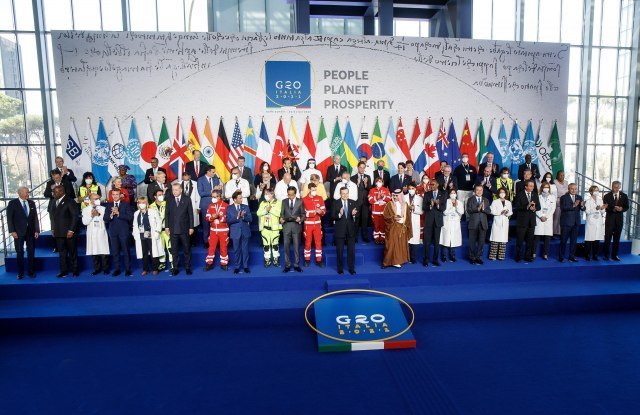The invasion of Ukraine has rapidly returned echoes of a Cold War mentality to the West. Russia was excluded from the Group of Eight (G8) powers over its annexation of the Crimea peninsula in 2014. Now, Lithuanian and Polish authorities have called on the international community to remove Russia from the G20 format and suspend its membership in other international organizations after it attacked Ukraine.
“We must immediately suspend Russia’s membership in international organizations,” the Lithuanian president said. Russia as an aggressive force committing war crimes in Ukraine has to face severe consequences. President Joe Biden said that he would support Russia being expelled from the G20 over its invasion of Ukraine, a step that would further isolate Vladimir Putin on the international stage.
G7 was a precedent
Western leaders replaced a Group of Eight meeting that Russia was to host in Sochi in 2014 with a Group of Seven meeting in Brussels, effectively suspending Russia’s G8 membership in the process. This decision was made by the Obama administration to isolate Moscow for its takeover of Crimea.
Russia liked being in the G8, because it gave them prestige. It made them appear to be one of the major international players. Russia was added in 1998 to the G8, which includes Japan, Canada, Germany, France, Italy and the United Kingdom. Western powers had hoped this would steer Russia toward economic and civil reforms, something in tatters after 2014 and especially after the war in Ukraine.
Excluding Russia from G20 could be next
The Group of 20, most commonly referred to as the G20, is an international association of 19 states and the supranational EU. The group's main summit takes place annually, with government leaders and central bank governors from the respective countries coming together ostensibly to discuss economic matters and global financial stability. The resolutions the G20 issue are seen as political declarations of intent but they are not legally binding.
The members of the G20 are as follows: Argentina, Australia, Brazil, Canada, China, the European Union, France, Germany, India, Indonesia, Italy, Japan, Mexico, Russia, Saudi Arabia, South Africa, South Korea, Turkey, the United Kingdom, and the United States.
Collectively, the G20 economies account for around 85% of global GDP. Their members account for 80% of world trade and two-thirds of the world's population. The Organization for Economic Co-operation and Development (OECD) , the international think-tank, serves as the unofficial secretariat of the G20. At the gatherings, the EU is represented by the European Commission and the ECB, while the G20 also extends invites to "permanent guest invitees," who can attend and participate among them are among others the WTO and Spain.
The origins of the G20 go back to the June 1999 meeting in Cologne of the G7 (then the G8). Vowing to learn lessons from the 1997 Asian financial crisis, the G8 heads of states back then agreed to devise an international forum bringing 20 of the world's most important economic powers and actors together regularly. The first formal G20 gathering was a meeting of finance ministers and central bank governors in Berlin in December 1999. The G20 membership was decided by Caio Koch-Weser and Timothy Geithner, the deputies of the German and US finance ministers at the time.
The G20 leaders process was born in a unique moment in history, the foundations for which have now collapsed. Just as G7 leaders started meeting at a time of global economic upheaval with the collapse of the Bretton Woods system in the 1970s, the first G20 leaders’ summit in November 2008 took place in Washington amid a changing global economic landscape as the world came together to fight the 2008 financial crisis. The G7 recognized their economic clout was no longer enough without China.
The big misconception many people have about G7 and G20 is that the membership is based on GDP ranking—this is simply not true. The most glaring example (for G20) is Spain. The Spaniards have the 13th largest economy according to IMF estimates but do not have a seat in the G20. They are only represented via a guest seat and the European Union. Purely on a GDP basis, South Africa and Argentina would not be on the list.
The inclusion of Saudi Arabia reflected not so much that it was considered more ‘systemically significant’ than other countries, but that an effort had been made to include good allies of the US in the forum. In this line, the exclusion of Russia is a must.
New G20 or G25 format
But if Russia would be excluded then maybe it is time to rethink the format. Many diplomats were discussing the possibility of creating a group of G25, G30 or giving an observer seat or even a spot in the group to Poland, Netherlands or Nigeria.
Undoubtedly for the group to remain relevant and sufficiently elite, it has to impose limits on its membership. However, a strong case can be made for the addition of at least ten more powers, mostly from Asia, Middle East or Eastern Europe, in order to better reflect the economic and geopolitical realities of the world.
G20 aims to reflect regional differences but since the largest economies are mostly concentrated in North America, Europe, and Asia/Pacific the voices from Africa are underrepresented.
Hence some countries like South Africa are placed to reflect all African preferences and guest countries fill in the additional holes to their region’s underrepresentation. For the G7, China and India are the great outliers in this grouping as well, each with the 2nd and 5th largest economies but not having a seat in G7.
In the current post pandemic economy suffering from the backlash caused by the shock of war in Ukraine, many developing countries will suffer from economic setbacks, and it’s not safe to list names for the next expanded G20. But one might believe that e.g. Nigeria, Kenya, Morocco, Egypt, Vietnam or Thailand should be taken into account.
The simplest idea would be the idea that Russia should be replaced by Poland owing to Moscow's invasion of Ukraine. According to World Bank data for 2020, Poland is the 21st biggest economy in the world and currently is the crucial actor in the eastern flank of NATO which overnight became home to more than 2 million refugees from Ukraine.
Clearly the Polish economy is headed toward a leadership role in Europe with one of the fastest growth rates in the last 30 years. As a member of the European Union, it could be said already to have a seat at the G20 (the EU does), but the same would apply to 20-listers France, Germany and Italy.
However, any decision to exclude a country from G20 would have to be unanimous. If not, it could result in the breakup of the forum as China would probably veto the exclusion of Russia. But the most important voice is of the Western powers and US which can re-establish the same forum without Russia and even China if they like. Otherwise G20 will end or become a smaller gathering of G10 or G15 countries.


